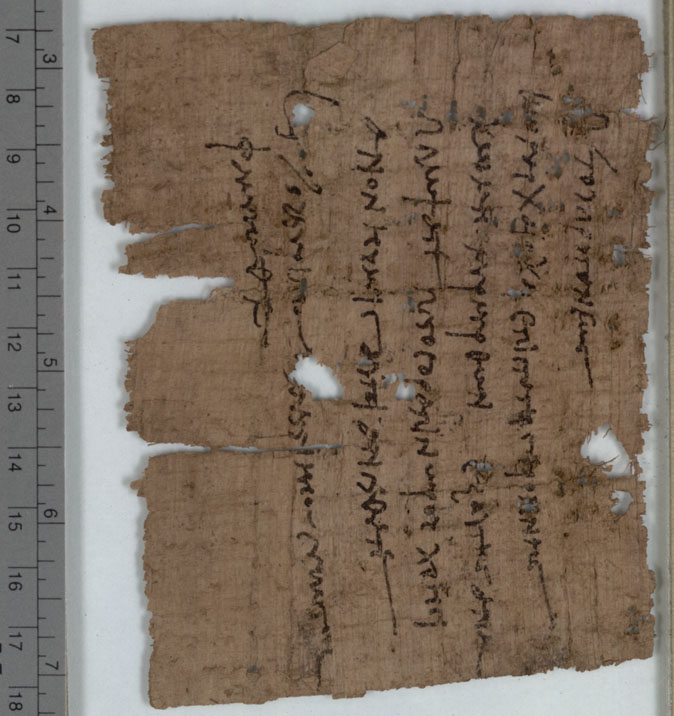
 |
Freethought & Rationalism ArchiveThe archives are read only. |
|
|||||||
|
|
Thread Tools | Search this Thread |
|
|
#111 | ||
|
Veteran Member
Join Date: Nov 2007
Location: Chicago, IL
Posts: 3,058
|
Quote:
Jeffrey |
||
|
|
|
|
#112 | |
|
Contributor
Join Date: Mar 2006
Location: Falls Creek, Oz.
Posts: 11,192
|
Quote:
Have a look at the thread entitled: what is the difference between χρησιανόν and χρισιανόν ? Christos = greek Χριστός (with an iota) = 'annointed' Chrestos = greek χρηστός (with an eta) = 'good/ethical' To the commoner, the chrestian religion was the religion of the good and ethical, and this had in one form or another existed for thousands of years, totally independent of christianity. A play on words happened at some stage. Χριστός was conflated with χρηστός, The question is: which century. Best wishes, Pete Brown |
|
|
|
|
|
#113 | |||
|
Veteran Member
Join Date: Nov 2007
Location: Chicago, IL
Posts: 3,058
|
Quote:
Why would anyone make the mistake of confusing one for the other? Χριστός is a noun χρηστός is an adjective which, when applied to men means good in the sense of "honest, worthy, kindly", and when applied to members of a community means "useful, deserving", (cf. Demostenes 20.7), but so far as I can see, never "ethical". There is no indication anywhere, so far as I know, that the term χρηστός was ever applied by outsiders to members of the Jesus movement or that Christianity was ever called, let alone known, by outsiders as the "religion of the good, the honest, the worthy". Quote:
In any case, I'm flumoxed if I can see how what you tell Magdyln to look at will be of any use in answereing her questions about whether "chrism" apperas in the gospels and what Jesus was called Christos. Jeffrey |
|||
|
|
|
|
#114 | |||||||
|
Veteran Member
Join Date: Mar 2004
Location: Massachusetts
Posts: 2,230
|
Quote:
Quote:
Quote:
Quote:
Quote:
Mary anointed Jesus, whether the Greek word was chrism, or chrisma or not. I believe you quibbled about whether Judas Maccabeus should be called a kind of messiah b/c he had not been physically anointed. But it's OK to call Jesus "Christ" in your opinion, based on a spiritual anointing? Quote:
Quote:
|
|||||||
|
|
|
|
#115 | ||
|
Contributor
Join Date: Mar 2006
Location: Falls Creek, Oz.
Posts: 11,192
|
Quote:
Most people could not write. They relied on hearing the words, not seeing them. The two words when pronounced in the greek tongue sound almost the same. The same might also be claimed for the Latin equivalents (ie: christos and chrestos are very similar sounding) Does this explain why people might make the mistake of confusing one for the other? Best wishes, Pete Brown |
||
|
|
|
|
#116 | ||
|
Veteran Member
Join Date: Nov 2007
Location: Chicago, IL
Posts: 3,058
|
Quote:
Leaving aside the matter of whether you've begged the question with your claim about Greek pronunciation of the two words (you know this how?, do you confuse a noun for an adjective, no matter how similarly pronounced, especially when you hear anyone use these words in a sentence? More importantly, would the ancients -- who didn't have to read it to know their own language, especially since the use in speech of the adjective involved using inflected and arthrous forms which would acutally distinguish it from the noun, and the sytax of the sentence in which it was used would give its nature as an adjective away, even if the pronunciations of the initial vowel elided?? And where is your evidence that Christians were called "good" by outsiders and that Christainity known as the "religion" of the good? As usual, you are vamping, Pete, while you are skating on very thin ice. Jeffrey |
||
|
|
|
|
#117 | ||
|
Veteran Member
Join Date: Nov 2007
Location: Chicago, IL
Posts: 3,058
|
Quote:
My exact words, in response to your claim that "According to Jewish thought as shown a bit later, the mosiach was supposed to be a human being, not a god. And he was not supposed to be killed, he was supposed to rule on earth. Cyrus of Persia is an early example. Judas Maccabeus another", were: Where in any Jewish text, canonical or non canonical, is Judas proclaimed as Messiah? Nothing more. Nothing less. So here again, you express an unfounded (and wrong) belief. BTW, you still haven't answered that question -- or acknowledged that Judas didn't do the things you claim he did -- namely that "He brought peace and self rule to Judah" or that your belief that he was anointed, let alone anointed as the Messiah of Jewish expectation is not depicted anywhere in any Jewish work, canonical or non canonical. Quote:
Jeffrey |
||
|
|
|
|
#118 |
|
Veteran Member
Join Date: Mar 2004
Location: Massachusetts
Posts: 2,230
|
Please fix quote tags, it seems like my words are yours. ty
|
|
|
|
|
#119 | |
|
Veteran Member
Join Date: Mar 2004
Location: Massachusetts
Posts: 2,230
|
Quote:
|
|
|
|
|
|
#120 | ||
|
Contributor
Join Date: Mar 2006
Location: Falls Creek, Oz.
Posts: 11,192
|
Quote:
of P.Oxy 3035 From WIKI we have the following: Quote:
a "christian" but is about a "chrestian". How do you resolve this? Quite clearly, publications such as The Oxyrhynchus New Testament Papyri:. “Not Without Honor Except in Their Hometown”? ELDON JAY EPP. 5–55. do not. They claim it is christian. Another Prosenes-like assumption. Best wishes, Pete ps: here is an image of the greek fragment 
|
||
|
|
| Thread Tools | Search this Thread |
|